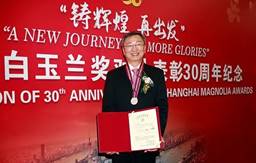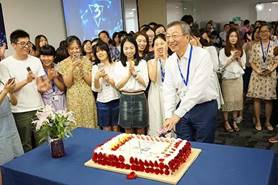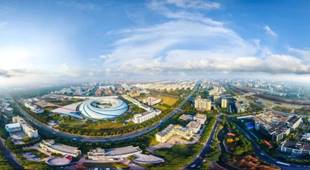Zhangjiang boasts strong medical industry

Tan Lingshi, founder of biomedical company dMed, receives the Shanghai Magnolia Silver Award on Sept 12. [Photo/Wechat account: thepapernews]
“I hope to see more Chinese patients benefit from global medical research and talent cultivation and to see China’s medical innovation environment improve. I will pursue this dream in Shanghai.”
Tan Lingshi said this on Sept 12 while receiving the Shanghai Magnolia Silver Award from the municipal government of Shanghai, one of the highest honors a foreigner can receive in the city, in recognition of his outstanding contributions to the city's development.
Tan has selected Shanghai’s Zhangjiang Zone as his base of operations two times since first getting involved in biomedicine more than a decade ago. The first time was when he set up an R&D center in the zone while working for the multinational pharmaceutical company Pfizer. The second time was when he started his own business there due to the rapid development of new drug R&D in China.
Tan is one of many medical personnel attracted to Zhangjiang for its world-class biomedicine industrial cluster, support for innovation, abundant talent, and improving living environment.
The two times Tan selected Zhangjiang
Tan said he initially had doubts about conducting new drug R&D in China, as many at Pfizer were skeptical about it.
At the time, there were few tall buildings and no subway in Zhangjiang. A software park had just begun construction in the zone, but there weren’t many biomedicine companies there.
Under a lot of pressure, Tan finally persuaded himself and his colleagues to set up operations in Zhangjiang after doing some thorough research.
In 2015, Pfizer decided to locate its Chinese R&D center in Zhangjiang. The center now employs more than 1,000 professionals, making it a crucial part of Pfizer’s R&D system.
Tan said that Pfizer’s final decision was due to Shanghai’s reputation as a world city with a great business environment. Some of the deciding factors were the city’s abundance of talent, its developed infrastructure, and its high-quality industrial support facilities.
Ever since Swiss pharmaceutical giant Roche first established Roche Pharma China in Zhangjiang in 1994, many domestic and international pharmaceutical companies have been attracted to Zhangjiang. Over 600 healthcare enterprises have had operations in the zone at some point, and the zone now has a complete industrial chain involving new drug R&D, clinical trials, production, and marketing.
Tan said he was impressed by the changes China’s medical industry has undergone, and so he decided to leave Pfizer and start his own biopharmaceutical company, dMed, in 2016. Over the past three years, dMed has carried out clinical trials for more than 80 pharmaceutical companies.

Biopharmaceutical company dMed celebrates its third anniversary. [Photo/Wechat account: thepapernews]
The Pfizer R&D center and dMed are just a small part of Zhangjiang’s thriving medical industry. In 2018, the zone’s medical industry generated 72.10 billion yuan ($10.25 billion) in total revenue, accounting for 30.4 percent of Shanghai’s entire medical industry and 66.2 percent of Pudong’s.
Zhangjiang is now home to nearly 150 national-level R&D institutions, which have generated more than 1,000 patents. The zone currently has over 400 drugs being researched and over 130 in the clinical trial stage.
Successful reform measures
Roche, the first pharmaceutical company to set up operations in Zhangjiang and register in the Shanghai Free Trade Zone (FTZ), has developed rapidly in Shanghai over the past 25 years.
Zhou Hong, president of Roche Pharma China, said that some innovative drugs developed by Roche, hailed as lifesaving drugs by many (especially cancer patients), have been enjoying quick customs clearance thanks to well thought-out policies.
How quickly the lifesaving drugs can enter China is important to patients and their families. In 2016, Roche was able to enjoy quicker customs clearance because it was approved as a “high-level certified enterprise” by Shanghai Customs. The approval was largely due to being registered in Shanghai (FTZ).
In 2018, customs clearance for Roche’s drugs was further streamlined thanks to Shanghai’s new measures aimed at optimizing its business environment. The measures resulted in a 30-percent reduction in customs clearance time, meaning patients could get their drugs quicker.
“Both the company and patients have benefited a lot from these reform measures,” said Zhou. “The policies are good for our company.”
To create a better business environment for the biomedicine industry, Shanghai also plans to shorten customs clearance time for biomaterial needed for drug R&D, according to a recent announcement.
In 2016, Shanghai reformed its marketing authorization holder (MAH) system. A MAH is a company, firm, or non-profit organization that has been granted marketing authorization, allowing them to market a specific medicinal product.
By the end of October, 54 units had applied for MAH status with 131 medical products, including 31 first-class innovative drugs that have yet to enter the market. To date, 63 medical products have been approved to enter the market.
With the launch of a series of reform measures for medical products and medical equipment, more and more innovative drugs developed in Shanghai are expected to be sold in China in the near future. This is expected to provide a boost to the biomedicine industry in Shanghai.
A better place to work and live
In 2016, Tan was determined to establish dMed in Zhangjiang, despite receiving invitations from many technology parks throughout China. He said access to talent was the most important factor in his decision.
Zhangjiang has attracted many global medicine giants and a lot of international talent. The medical schools of Shanghai Jiao Tong University, Fudan University, and Shanghai University of Medicine and Health Sciences have also provided a lot of medical talent.
Zhou said that she has benefited from FTZ talent policies, as she has obtained China’s first permanent ID card under recommendation by the Shanghai FTZ .
“The card allows me to work and live. For example, I can use it for the automated customs clearance channel, to buy train tickets, and to check into hotels,” said Zhou, “and most importantly, it has enhanced my determination to set up roots in China.”
In 2018, Pudong issued new policies to support innovation and entrepreneurship, and will implement talent development policies in the near future.
Zhangjiang is also striving to create a more livable environment. Tan said his first meal in Zhangjiang was at Roche’s canteen since there were no available restaurants. However, one can now find various restaurants, shopping malls, and entertainment parks in Zhangjiang just by taking a look at their mobile phone.
A worker who lived in Zhangjiang for five years said he is enjoying its modern conveniences, great natural environment, and high-quality infrastructure, and appreciates Zhangjiang’s ecofriendly development goals.
Xia Shihui, a new graduate who recently started working in Zhangjiang, said the zone seems like a promising place. “I see people working in tall office buildings under the blue sky or lounging around in fitness centers throughout Zhangjiang.”

Zhangjiang is a land of green under a blue sky. [Photo/Wechat account: thepapernews]
